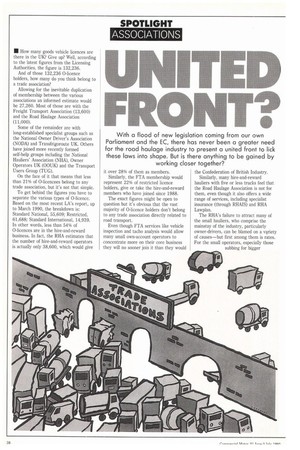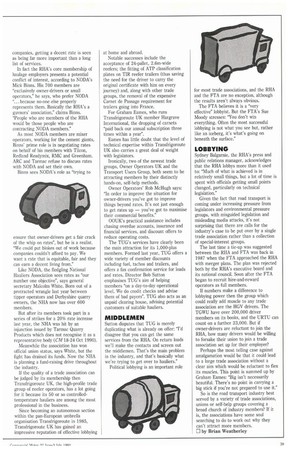UPI 'TED NT?
Page 40

Page 41

If you've noticed an error in this article please click here to report it so we can fix it.
With a flood of new legislation coming from our own Parliament and the EC, there has never been a greater need for the road haulage industry to present a united front to lick these laws into shape. But is there anything to be gained by working closer together?
• How many goods vehicle licences are there in the UK? Give up? Well, according to the latest figures from the Licensing Authorities, the figure is 132,236.
And of those 132,236 0-licence holders, how many do you think belong to a trade association?
Allowing for the inevitable duplication of membership between the various associations an informed estimate would be 27,260. Most of those are with the Freight Transport Association (13,600) and the Road Haulage Association (11,000).
Some of the remainder are with long-established specialist groups such as the National Owner Driver's Association (NODA) and Transfrigoroute UK. Others have joined more recently formed self-help groups including the National Hauliers' Association (NHA), Owner Operators UK (00UK) and the Transport Users Group (TUG).
On the face of it that means that less than 21% of 0-licencees belong to any trade association, but it's not that simple.
To get behind the figures you have to separate the various types of 0-licence. Based on the most recent LA's report, up to March 1990, the breakdown is: Standard National, 55,609; Restricted, 61,688; Standard International, 14,939. In other words, less than 54% of 0-licences are in the hire-and-reward business. In fact, the RHA estimates that the number of hire-and-reward operators is actually only 38,600, which would give it over 28% of them as members.
Similarly, the FTA membership would represent 22% of restricted licence holders, give or take the hire-and-reward members who have joined since 1988.
The exact figures might be open to question but it's obvious that the vast majority of 0-licence holders don't belong to any trade association directly related to road transport.
Even though FTA services like vehicle inspection and tacho analysis would allow many small own-account operators to concentrate more on their core business they will no sooner join it than they would the Confederation of British Industry.
Similarly, many hire-and-reward hauliers with five or less trucks feel that the Road Haulage Association is not for them, even though it also offers a wide range of services, including specialist insurance (through RHAIS) and RHA Lawplan.
The RHA's failure to attract many of the small hauliers, who comprise the mainstay of the industry, particularly owner-drivers, can be blamed on a variety of causes—but first among them is rates. For the small operators, especially those subbing for bigger companies, getting a decent rate is seen as being far more important than a long list of services.
In fact the RHA's core membership of haulage employers presents a potential conflict of interest, according to NODA's Mick Binns. His 700 members are "exclusively owner-drivers or small operators," he says, who prefer NODA "...because no-one else properly represents them. Basically the RHA's a guvnors' association," claims Binns. "People who are members of the RHA would be those people who are contracting NODA members."
As most NODA members are mixer operators, working for the cement giants, Binns' prime role is in negotiating rates on behalf of his members with Tilcon, Redland Readymix, RMC and Greenham. ARC and Tarmac refuse to discuss rates with NODA and set their own.
Binns sees NODA's role as "trying to ensure that owner-drivers get a fair crack of the whip on rates", but he is a realist. "We could put blokes out of work because companies couldn't afford to pay. We want a rate that is equitable, fair and they can earn a decent living from."
Like NODA, the fledgling National Hauliers Association sees rates as "our number one objective", says general secretary Malcolm White. Born out of a protracted wrangle last year between tipper operators and Derbyshire quarry owners, the NHA now has over 600 members.
But after its members took part in a series of strikes for a 20% rate increase last year, the NHA was hit by an injunction issued by Tarmac Quarry Products which does not recognise it as a representative body (CM18-24 Oct 1990).
Meanwhile the association has won official union status, says White, but the fight has drained its funds. Now the NHA is planning a fund-raising drive throughout the industry.
If the quality of a trade association can be judged by its membership then Transfrigoroute UK, the high-profile trade group of reefer operators, has a lot going for it because its 50 or so controlledtemperature hauliers are among the most professional in the business.
Since becoming an autonomous section within the pan-European umbrella organisation Transfrigoroute in 1985, Transfrigoroute UK has gained an impressive reputation of effective lobbying at home and abroad.
Notable successes include the acceptance of 24-pallet, 2.6m-wide reefers; the fitting of ATP classification plates on TIR reefer trailers (thus saving the need for the driver to carry the original certificate with him on every journey) and, along with other trade groups, the removal of the expensive Carnet de Passage requirement for trailers going into France.
For Graham Eames, who runs Transfrigoroute UK member Hargrave International, the dropping of carnets "paid back our annual subscription three times within a year".
Eames has little doubt that the level of technical expertise within Transfrigoroute UK also carries a great deal of weight with legislators.
Ironically, two of the newest trade groups, Owner Operators UK and the Transport Users Group, both seem to be attracting members by their distinctly hands-on, self-help methods.
Owner Operators' Rob McHugh says: "In order to improve the situation for owner-drivers you've got to improve things beyond rates. It's not just enough to get rates up — you've got to maximise their commercial benefits."
00UK's practical assistance includes chasing overdue accounts, insurance and financial services, and discount offers to reduce operating costs.
The TUG's services have clearly been the main attraction for its 1,000-plus members. Formed last year, TUG offers a wide variety of member discounts including fuel, tachos and trailers, and offers a fax confirmation service for loads and rates, Director Bob Sutton emphasises TUG's aim of helping members "on a day-to-day operational level. We do credit checks and advise them of bad payers". TUG also acts as an unpaid clearing house, advising potential customers of suitable hauliers.
MIDDLEMEN
Sutton disputes that TUG is merely duplicating what is already on offer: "I'd disagree that you can get the same services from the RHA. On return loads we'll make the contacts and screen out the middlemen. That's the main problem in the industry, and that's basically what we're trying to get over to hauliers."
Political lobbying is an important role for most trade associations, and the RHA and the FTA are no exception, although the results aren't always obvious.
The FTA believes it is a "very effective" lobbyist. But the FTA's Sue Moody stresses: "You don't win everything. Often the most successful lobbying is not what you see but, rather like an iceberg, it's what's going on beneath the surface."
LOBBYING
Sydney Balgarnie, the RHA's press and public relations manager, acknowledges that the RHA lobbys more than it used to: "Much of what is achieved is in relatively small things, but a lot of time is spent with officials getting small points changed, particularly on technical legislation."
Given the fact that road transport is coming under increasing pressure from legislators and environmental pressure groups, with misguided legislation and misleading media attacks, it's not surprising that there are calls for the industry's case to be put over by a single trade association rather than a collection of special-interest groups.
The last time a tie-up was suggested between the RHA and FTA was back in 1987 when the FTA approached the RHA with merger plans. The plan was rejected both by the RHA's executive board and its national council. Soon after the FTA began to recruit hire-and-reward operators as full members.
If numbers make a difference to lobbying power then the group which could really add muscle to any trade association are the HGV drivers. The TGWU have over 200,000 driver members on its books, and the URTU can count on a further 23,000. But if owner-drivers are reluctant to join the RHA, how many drivers would be willing to forsake their union to join a trade association set up for their employer?
Perhaps the most telling case against amalgamation would be that it could lead to a large trade association without a clear aim which would be reluctant to flex its muscles. This point is summed up by Graham Eames: "Big isn't necessarily beautiful. There's no point in carrying a big stick if you're not prepared to use it."
So is the road transport industry best served by a variety of trade associations, unions or self-help groups covering a broad church of industry members? If it is, the associations have some soul searching to do to work out why they can't attract more members.
0 by Brian Weatherley












































































































